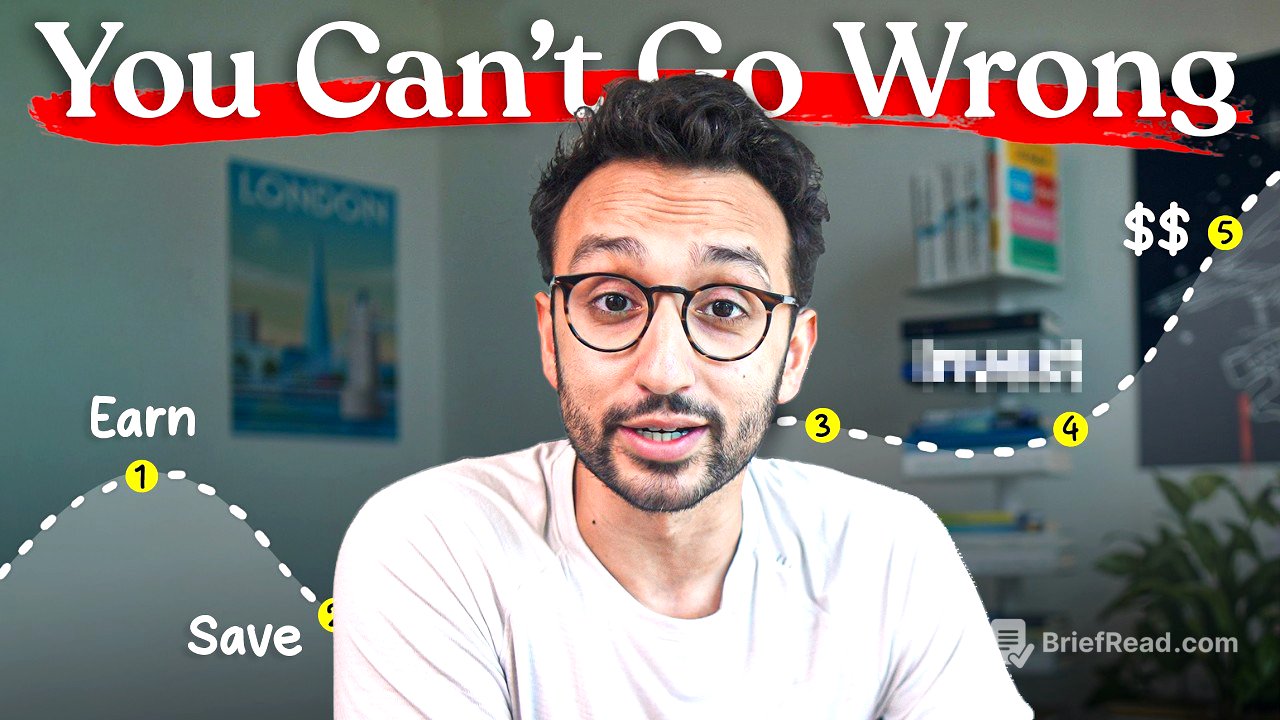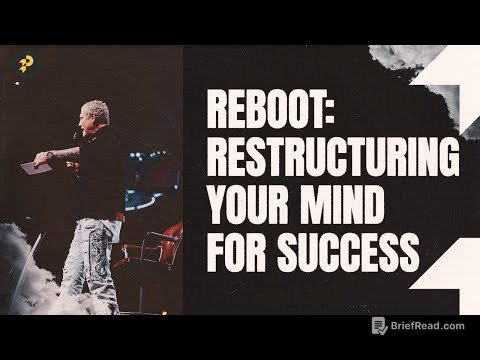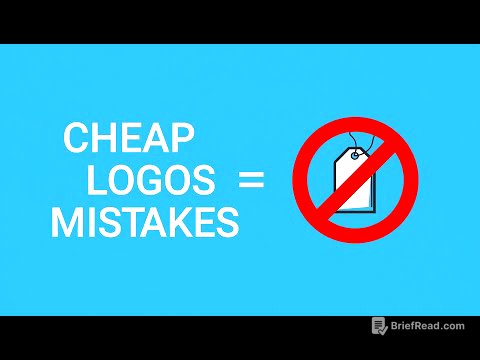TLDR;
This video explores the path to financial freedom, emphasizing the importance of managing energy, building consistent systems, and creating value outside of a traditional 9-to-5 job. It distinguishes between financial freedom (where work is optional) and time freedom (control over one's schedule), advocating for lifestyle businesses that prioritize personal fulfillment alongside financial goals. The discussion covers strategies for earning more money, identifying valuable business opportunities by focusing on solving problems for those with the means to pay, and the significance of consistency and clear goal-setting for sustained motivation and success.
- Financial freedom is defined as having enough passive income to cover expenses, making work optional.
- Time freedom is about having control over how you spend your time.
- Earning more money is the most effective path to financial freedom.
- Lifestyle businesses prioritize the founder's desired lifestyle alongside financial success.
- Identifying and solving problems for people with money is key to creating value and a successful business.
- Consistency and clear goal-setting are crucial for maintaining motivation and achieving long-term success.
Financial Freedom vs Time Freedom [0:49]
Financial freedom is defined as reaching a point where work becomes optional due to sufficient income from passive sources like investments, rental income, or royalties, enough to cover one's expenses. It's quantified by the amount of money or assets one possesses, such as having a substantial amount in stocks. Time freedom, however, is about having control over how one spends their time. Financial freedom is viewed as a destination goal, while time freedom is seen as a journey goal.
The 3 Paths to Financial Freedom [2:36]
There are three primary methods to achieve financial freedom: saving money, investing money, and earning more money. While school often emphasizes saving, it's generally insufficient on its own. Investing can be a path, but relying solely on investment returns without a substantial income can take decades. Earning more money is presented as the most effective way to accelerate the journey to financial freedom, as it directly increases the amount available for saving and investing.
How To Earn More Money [6:08]
Earning more money can be achieved through various methods, including seeking raises or transitioning to higher-paying roles within a day job. However, these options often come with limitations on time freedom. The method of earning money significantly impacts the level of time freedom one experiences. Remote work, for example, can offer more time freedom than traditional corporate jobs, even with similar pay. The concept of the "four Fs"—fun, flexibility, fulfillment, and finances—is introduced as a framework for evaluating different methods of making money based on their freedom profile.
Lifestyle Businesses [11:27]
A lifestyle business is defined as a business focused on enabling the founder to live the life they desire, contrasting with traditional businesses that prioritize growth and profit maximization above all else. These businesses often involve a small team and aim to provide the founder with a desired freedom profile, balancing fun, flexibility, fulfillment, and finances. While the term "lifestyle business" can be seen negatively in places like Silicon Valley, it is presented here as a worthwhile goal, allowing individuals to replace their full-time income and gain time freedom without necessarily aiming to become billionaires.
How To Create Value [15:41]
Creating value, which is essential for making money, involves identifying a person with a problem and offering a solution they are willing to pay for. The process of starting a business should begin with creating a "problems list" by asking people with money about their challenges. Businesses are essentially vehicles that provide solutions to these problems. It's easier to succeed when addressing a painful problem that someone has the means to solve. Services, digital products, and education are highlighted as easier business models to start with compared to physical products or apps.
Hard Work ≠ Financial Freedom [19:59]
Working hard does not guarantee financial freedom; the vehicle chosen to create value significantly impacts the potential for success. Choosing the right combination of solution, problem, and target person is crucial. Some ventures, like starting a kebab shop or coffee shop, may involve hard work but offer limited financial returns. Aspiring entrepreneurs should focus on finding the right vehicle that allows them to create value and build a lifestyle business that works towards financial freedom.
Boring Wins Over Sexy [22:47]
The more appealing or glamorous an industry seems, the more competition there will be, making it harder to succeed. Businesses or careers in less "sexy" or "cool" areas often face less competition. It's easier to succeed in a business or career that is not considered cool because of reduced competition. The book "The Sweaty Startup" by Nick Huber is recommended, which talks about starting unglamorous businesses to gain financial freedom.
Finding Your Target Audience [28:23]
When seeking business ideas, it's important to ask rich people about their problems, as they have the means to pay for solutions. Businesses should target clients who can afford their services. To gather a wide range of problems, reach out to a large number of people (100-200) through various means, such as walking into local businesses or leveraging warm connections.
Staying Consistent [30:48]
The hardest part of any endeavor is getting started, with a significant percentage of people never taking action on their ideas. The second hardest part is maintaining consistency for at least a year. Success often follows a J-curve, where initial efforts may not yield immediate results, but persistence eventually leads to progress. Picking something, starting it, and sticking with it are crucial for achieving success and financial freedom.
Idea Validation [35:46]
It's recommended to validate business ideas before investing significant time and resources. This involves testing the market by seeking indications of interest and willingness to pay from potential customers. A six-week period is suggested for validating each business idea, focusing on getting someone to commit to paying for the product or service. If no signal from the market is received within six weeks, the idea should be scrapped in favor of another.
Balancing Time and Financial Freedom [38:50]
Achieving financial freedom often requires sacrificing some time to build the business or vehicle that will generate the necessary income. While building a business, it's important to find ways to enjoy the process. Investing time in building a freedom engine is a personal choice, and it's acceptable to prioritize other aspects of life instead.
Time Management [42:34]
Effective time management involves prioritizing tasks and recognizing that everything in life operates on a diminishing return spectrum. Students and those with jobs can build businesses on the side by strategically allocating their time and focusing on the most important tasks. It's possible to "half-ass" certain commitments to free up time for building a business.
Setting The Right Goals [46:34]
Knowing what the right thing to do requires having a clear goal. The clearer the goal, the easier it becomes to prioritize and strategize. Methods for determining goals include envisioning life if one won the lottery, imagining an ideal Tuesday, and creating a vision board. A clear goal leads to better plans and systems, making time management and focus easier.
How To Stay Motivated [52:02]
Money and fun are not always sustainable motivators for entrepreneurs. Connection with the team and audience, as well as the feeling of contribution and impact, are key to long-term motivation. Building a lifestyle business with an in-person team and finding ways to feel the tangible impact of one's work can help maintain motivation. At a certain point, leaving money on the table and prioritizing connection and contribution becomes more important for overall fulfillment and freedom.









